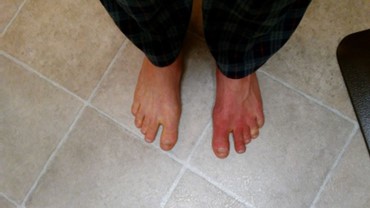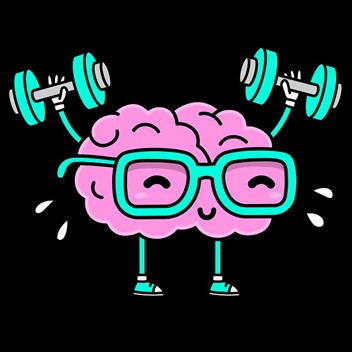
For the past ten years, I’ve suffered from a rare medical condition called erythromelalgia (EM for short). EM causes my feet (sometimes just one foot) to become red, hot, and swollen for no reason, and it can be very painful.

EM has no cure, so managing the symptoms is all anyone can do. Exposure to heat makes symptoms worse, and keeping my feet cool makes them better. Thus, for the past decade, I’ve managed my EM by soaking my feet in buckets of cold water, applying cooling gels, using fans, and wearing sandals year round.
Curing the Incurable
But a few months ago, I stumbled across a radical treatment called “Bob’s Protocol.” Bob is no one special – just a guy from Las Vegas who has this condition. He read about nerve desensitization therapy for other disorders and decided to try it on his EM. In a move we might call going “hot turkey,” Bob quit all cooling methods and deliberately started heating his feet up each night via hot water soaks and hot showers.
Initially, of course, his symptoms got worse. But surprisingly, within just a few days, they started getting better, so he kept at it. Things continued to get better, and he is now basically cured of his incurable disease.
I started Bob’s protocol at the beginning of the summer and was shocked at how effective it is. My EM did briefly get worse, but it quickly got better, and has continued to improve to the point where I barely have symptoms any more.
Forced Adaptation
Not only is this a classic demonstration of “The Dip” that people often experience before things get better, it’s also a great example of forced adaptation.
Essentially, Bob’s Protocol works because it forces your body to figure out how to handle heat. I’d been intervening with cold water, fans, and whatnot whenever my feet got hot, so my body had forgotten how to cool down on its own. Incredibly, after just a few days of being forced to deal with it, my feet started thermoregulating for the first time in ten years.
Forced adaptation applies to so much more than my rare medical condition. Your brain and your body are immensely adaptive, but they’ll only change if forced to.

Pushing Yourself
When you lift weights or do push-ups, your muscles are forced to adapt to the strain, and they become stronger.
When you run, swim, hike, or bike, your cardiovascular system is forced to adapt to the increased demand, and it becomes fitter.
When you sit in meditation, struggling to both focus on your breathing and tolerate the boredom of doing nothing, your mind becomes more attentive and more patient.
When you fast or take a cold showers, you force yourself to deal with discomfort and, as a result, become better at dealing with it, developing greater mental toughness.
When you take on more responsibilities, you force yourself to become more disciplined and organized. Similarly, when a teenager’s parents stop micromanaging and rescuing them from failure, the teen’s brain is forced to develop executive function and become more responsible.
Facing Life Head On

My experience overcoming EM actually reminded me of a previous experience of forced adaptation: sobriety.
When I quit alcohol and marijuana, I was forced to face my problems head on, and my brain adapted, figuring out in short order how to put my life back together and overcoming depression along the way.
Self-medication, digital distractions, stress eating – whatever it is you’re doing to avoid facing life head on, stop it. These things create dependency and make you feel less capable of handling life’s challenges, just as artificial cooling made my feet less capable of tolerating heat. Push through the initial discomfort by having faith in your ability to adapt.
Whatever it is, you can deal with it. If you force yourself to face it, you’ll figure it out.
